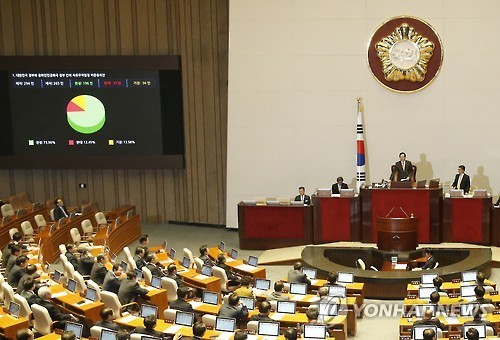South Korea’s National Assembly on Monday ratified the long-delayed free trade agreement with China, bringing an end to partisan wrangling over the trade pact that will reduce or eliminate tariff barriers to boost Korea’s exports toward its biggest trade partner.
Of the 265 attending lawmakers, 196 members voted in approval of the Korea-China FTA, which had been shelved since June, while 33 disapproved and 36 abstained in a plenary session vote. The deal is expected to take effect by year-end if the government completes necessary administrative steps that will take at least 20 days.
Upon the implementation, the two nations will enjoy tariffs cuts starting from the first round in December. According to the Ministry of Trade, Industry and Commerce, the FTA will immediately eliminate tariffs on Korean exports to China worth around $8.7 billion annually.
Before passing the motion, the rival parties had agreed to implement measures to compensate sectors expected to take a hit from the FTA. They vowed to build funds of some 1 trillion won ($870 million) over the next 10 years to provide financial assistance to agriculture and fishery businesses.
They also agreed to increase the amount of direct subsidies to the affected industries such as by having the farmers receive about 600,000 won per hectare of land by 2020, up from 350,000 won in 2015. The fishermen would be awarded with 700,000 won by 2020.
 |
| South Korea’s lawmakers gather on Monday to agree on the ratification of Korea-China Free Trade Agreeemnt. Yonhap |
The deal came after the partisan standoff persisted close to the legislative deadline for the agreement. The Saenuri Party had asserted that the Nov. 30 would be the last opportunity to approve the FTA, a scheme that it said would allow Korean companies to maximize benefit from the FTA’s tariff cuts.
The New Politics Alliance for Democracy refused to budge unless the government prepared steps to make up for the anticipated economic loss among the hard-hit sectors. The rival parties eventually reached a compromise Monday after overnight meetings.
Despite the bipartisan breakthrough, some lawmakers voiced their concerns over the deal, saying that the partisan agreement fell short of their expectations because the lawmakers were pressed for time to pass the deal in the 19th Assembly, which ends Dec. 9.
“(The agreement) has room for improvement,” said NPAD whip Rep. Lee Jong-kul. “I think we have failed to fully address China’s yellow dust and food safety. We apologize to the people for leaving those issues unresolved.”
Rep. Kim Jong-hoon, the Saenuri Party lawmaker who served as the Korean government’s chief negotiator of the Korea-U.S. FTA agreement during the Lee Myung-bak administration, opposed the agreement. He denounced the government’s attempt to raise funds as a plan to “extort” money from private companies.
Separately, lawmakers also agreed to ratify the FTAs with Vietnam and New Zealand that were signed in March and May, respectively, and the agreement to join the Asian Infrastructure Investment Bank, a Chinese-led financial institution of which South Korea’s is one of the 57 prospective founding members.
The FTA with Vietnam is expected to foster Korean companies’ investment in Korea’s third-largest export market and investment venue. The pact includes stronger measures to protect investors’ rights and to tear down trade barriers that prevent Korean companies from entering the market.
The FTA with New Zealand is expected to bring complimentary benefits to both nations as South Korea has comparative advantage in industrial products and New Zealand has the advantage in agricultural and dairy products.
Meanwhile, the parliamentary approval for the AIIB allows Korea to become an official founding member of the international institution. Korea holds a 3.81 percent share in the fund, its largest share in any international financial institution.
By Yeo Jun-suk (jasonyeo@heraldcorp.com)

